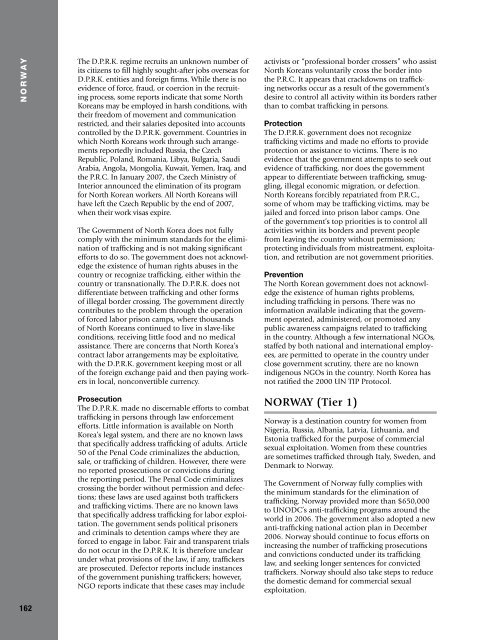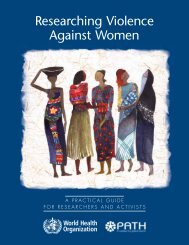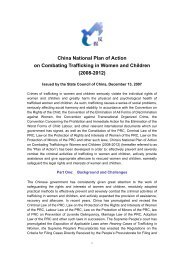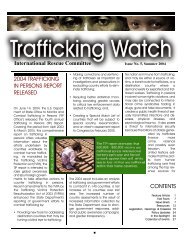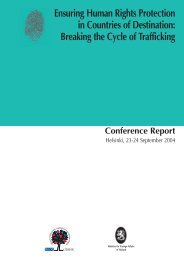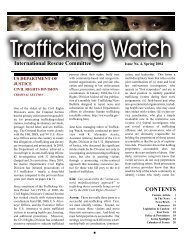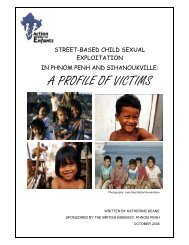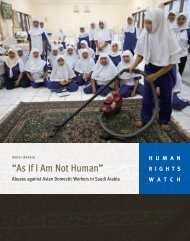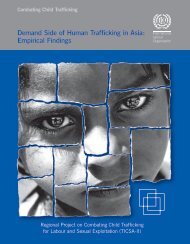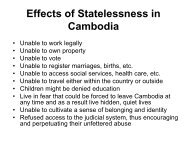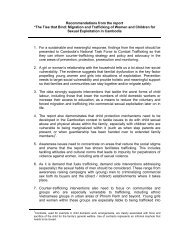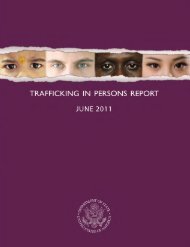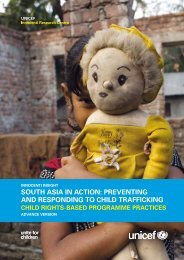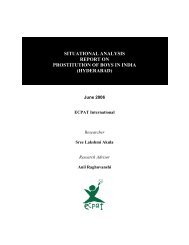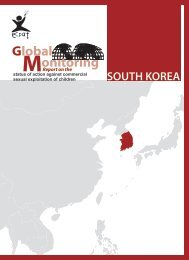2007 Trafficking in Persons Report - Center for Women Policy Studies
2007 Trafficking in Persons Report - Center for Women Policy Studies
2007 Trafficking in Persons Report - Center for Women Policy Studies
Create successful ePaper yourself
Turn your PDF publications into a flip-book with our unique Google optimized e-Paper software.
N O R W A Y<br />
162<br />
The D.P.R.K. regime recruits an unknown number of<br />
its citizens to fill highly sought-after jobs overseas <strong>for</strong><br />
D.P.R.K. entities and <strong>for</strong>eign firms. While there is no<br />
evidence of <strong>for</strong>ce, fraud, or coercion <strong>in</strong> the recruit<strong>in</strong>g<br />
process, some reports <strong>in</strong>dicate that some North<br />
Koreans may be employed <strong>in</strong> harsh conditions, with<br />
their freedom of movement and communication<br />
restricted, and their salaries deposited <strong>in</strong>to accounts<br />
controlled by the D.P.R.K. government. Countries <strong>in</strong><br />
which North Koreans work through such arrangements<br />
reportedly <strong>in</strong>cluded Russia, the Czech<br />
Republic, Poland, Romania, Libya, Bulgaria, Saudi<br />
Arabia, Angola, Mongolia, Kuwait, Yemen, Iraq, and<br />
the P.R.C. In January <strong>2007</strong>, the Czech M<strong>in</strong>istry of<br />
Interior announced the elim<strong>in</strong>ation of its program<br />
<strong>for</strong> North Korean workers. All North Koreans will<br />
have left the Czech Republic by the end of <strong>2007</strong>,<br />
when their work visas expire.<br />
The Government of North Korea does not fully<br />
comply with the m<strong>in</strong>imum standards <strong>for</strong> the elim<strong>in</strong>ation<br />
of traffick<strong>in</strong>g and is not mak<strong>in</strong>g significant<br />
ef<strong>for</strong>ts to do so. The government does not acknowledge<br />
the existence of human rights abuses <strong>in</strong> the<br />
country or recognize traffick<strong>in</strong>g, either with<strong>in</strong> the<br />
country or transnationally. The D.P.R.K. does not<br />
differentiate between traffick<strong>in</strong>g and other <strong>for</strong>ms<br />
of illegal border cross<strong>in</strong>g. The government directly<br />
contributes to the problem through the operation<br />
of <strong>for</strong>ced labor prison camps, where thousands<br />
of North Koreans cont<strong>in</strong>ued to live <strong>in</strong> slave-like<br />
conditions, receiv<strong>in</strong>g little food and no medical<br />
assistance. There are concerns that North Korea’s<br />
contract labor arrangements may be exploitative,<br />
with the D.P.R.K. government keep<strong>in</strong>g most or all<br />
of the <strong>for</strong>eign exchange paid and then pay<strong>in</strong>g workers<br />
<strong>in</strong> local, nonconvertible currency.<br />
Prosecution<br />
The D.P.R.K. made no discernable ef<strong>for</strong>ts to combat<br />
traffick<strong>in</strong>g <strong>in</strong> persons through law en<strong>for</strong>cement<br />
ef<strong>for</strong>ts. Little <strong>in</strong><strong>for</strong>mation is available on North<br />
Korea’s legal system, and there are no known laws<br />
that specifically address traffick<strong>in</strong>g of adults. Article<br />
50 of the Penal Code crim<strong>in</strong>alizes the abduction,<br />
sale, or traffick<strong>in</strong>g of children. However, there were<br />
no reported prosecutions or convictions dur<strong>in</strong>g<br />
the report<strong>in</strong>g period. The Penal Code crim<strong>in</strong>alizes<br />
cross<strong>in</strong>g the border without permission and defections;<br />
these laws are used aga<strong>in</strong>st both traffickers<br />
and traffick<strong>in</strong>g victims. There are no known laws<br />
that specifically address traffick<strong>in</strong>g <strong>for</strong> labor exploitation.<br />
The government sends political prisoners<br />
and crim<strong>in</strong>als to detention camps where they are<br />
<strong>for</strong>ced to engage <strong>in</strong> labor. Fair and transparent trials<br />
do not occur <strong>in</strong> the D.P.R.K. It is there<strong>for</strong>e unclear<br />
under what provisions of the law, if any, traffickers<br />
are prosecuted. Defector reports <strong>in</strong>clude <strong>in</strong>stances<br />
of the government punish<strong>in</strong>g traffickers; however,<br />
NGO reports <strong>in</strong>dicate that these cases may <strong>in</strong>clude<br />
activists or “professional border crossers” who assist<br />
North Koreans voluntarily cross the border <strong>in</strong>to<br />
the P.R.C. It appears that crackdowns on traffick<strong>in</strong>g<br />
networks occur as a result of the government’s<br />
desire to control all activity with<strong>in</strong> its borders rather<br />
than to combat traffick<strong>in</strong>g <strong>in</strong> persons.<br />
Protection<br />
The D.P.R.K. government does not recognize<br />
traffick<strong>in</strong>g victims and made no ef<strong>for</strong>ts to provide<br />
protection or assistance to victims. There is no<br />
evidence that the government attempts to seek out<br />
evidence of traffick<strong>in</strong>g, nor does the government<br />
appear to differentiate between traffick<strong>in</strong>g, smuggl<strong>in</strong>g,<br />
illegal economic migration, or defection.<br />
North Koreans <strong>for</strong>cibly repatriated from P.R.C.,<br />
some of whom may be traffick<strong>in</strong>g victims, may be<br />
jailed and <strong>for</strong>ced <strong>in</strong>to prison labor camps. One<br />
of the government’s top priorities is to control all<br />
activities with<strong>in</strong> its borders and prevent people<br />
from leav<strong>in</strong>g the country without permission;<br />
protect<strong>in</strong>g <strong>in</strong>dividuals from mistreatment, exploitation,<br />
and retribution are not government priorities.<br />
Prevention<br />
The North Korean government does not acknowledge<br />
the existence of human rights problems,<br />
<strong>in</strong>clud<strong>in</strong>g traffick<strong>in</strong>g <strong>in</strong> persons. There was no<br />
<strong>in</strong><strong>for</strong>mation available <strong>in</strong>dicat<strong>in</strong>g that the government<br />
operated, adm<strong>in</strong>istered, or promoted any<br />
public awareness campaigns related to traffick<strong>in</strong>g<br />
<strong>in</strong> the country. Although a few <strong>in</strong>ternational NGOs,<br />
staffed by both national and <strong>in</strong>ternational employees,<br />
are permitted to operate <strong>in</strong> the country under<br />
close government scrut<strong>in</strong>y, there are no known<br />
<strong>in</strong>digenous NGOs <strong>in</strong> the country. North Korea has<br />
not ratified the 2000 UN TIP Protocol.<br />
NORWAY (Tier 1)<br />
Norway is a dest<strong>in</strong>ation country <strong>for</strong> women from<br />
Nigeria, Russia, Albania, Latvia, Lithuania, and<br />
Estonia trafficked <strong>for</strong> the purpose of commercial<br />
sexual exploitation. <strong>Women</strong> from these countries<br />
are sometimes trafficked through Italy, Sweden, and<br />
Denmark to Norway.<br />
The Government of Norway fully complies with<br />
the m<strong>in</strong>imum standards <strong>for</strong> the elim<strong>in</strong>ation of<br />
traffick<strong>in</strong>g. Norway provided more than $650,000<br />
to UNODC’s anti-traffick<strong>in</strong>g programs around the<br />
world <strong>in</strong> 2006. The government also adopted a new<br />
anti-traffick<strong>in</strong>g national action plan <strong>in</strong> December<br />
2006. Norway should cont<strong>in</strong>ue to focus ef<strong>for</strong>ts on<br />
<strong>in</strong>creas<strong>in</strong>g the number of traffick<strong>in</strong>g prosecutions<br />
and convictions conducted under its traffick<strong>in</strong>g<br />
law, and seek<strong>in</strong>g longer sentences <strong>for</strong> convicted<br />
traffickers. Norway should also take steps to reduce<br />
the domestic demand <strong>for</strong> commercial sexual<br />
exploitation.


